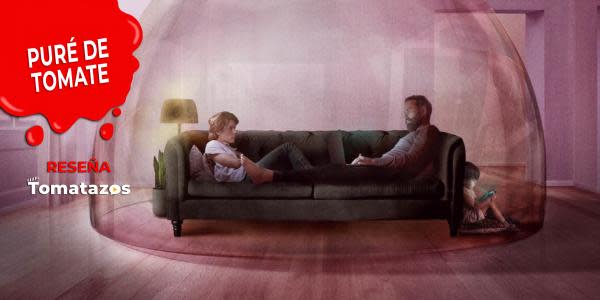Almost two years after the start of the pandemic and just short of the hardest stage of confinement, we have seen little work that addresses the impact of quarantine on the psyche. Concerned more with recreating the atmosphere inside hospitals or with reviewing public policies, the works we have seen on the health emergency have ignored the consequences of being locked up. That is why it is ironic that The pink cloud, Brazilian film that was made in 2019, be the best to portray them so far.
Do not miss: Sundance 2021: movies and shorts to keep track of
Directed by luli Gerbase, The pink cloud is the story of two strangers who spend the night together. The next day, a mandatory quarantine is announced for a toxic pink cloud that settles in his city. These two acquaintances, Iago (Eduardo Mendoca) and Giovanna (Renata de Lélis) will have to go through the confinement together, but when the emergency continues indefinitely, the relationship that begins friendly turns sinister as they come to terms with the idea that they will never be able to leave again.
The weight of the quarantine on the mental stability and relationship of both protagonists is, by far, the best element of the film. After its premiere at Sundance, many have highlighted the precision with which it portrays the fatigue we experience before COVID-19, as well as other elements of the pandemic. But little has been said about what it says about the role that space and distance play in our identity and the interpersonal relationships we form.
On The pink cloud, the relationship between Yago and Giovanna acquires different dynamics as time passes. At first sweet and cooperative, in the first weeks of confinement, although not without friction, and later cold and even aggressive when they discover that both have developed different positions on their situation and the cloud. The role of distance and space becomes more evident towards that second half when they separate and each decide to stay in one half of the apartment in which they live.
While Iago has come to terms with the idea that the cloud could never disappear, Giovanna seeks, in various ways, to resolve her satiety and is overwhelmed by that very possibility. This difference, between her desire to return to other spaces and his to assimilate the indivisible that from now on will be their experience of staying together gives way to a break that, in a chilling way, has a parallel with those who, in In real life, they do not support the real and stricter restrictions to fight the virus and those who have already conceded that the so-called “old normal” could never return. It is here that the role that distance and space play in shaping our identities and interpersonal relationships is best observed until recently. Both Mendoca and De Lélis carry that transformation and turbulent relationship flawlessly and deserve a mention for it.
We recommend you: REVIEW | Los Cabos 2021 | Belfast: the tragedy of moving out of childhood
Beyond these psychological issues, The pink cloud it also addresses the lack of distance in closed spaces through the subplots of secondary characters to reveal other social dynamics. For example, Giovanna’s younger sister gets trapped with a group of friends and the father of one of them, who eventually begins a “consensual” sexual relationship with them. This in a clear nod to the asymmetric power relationship in that home. There is another, also quite gloomy, about a friend of the protagonist who is left completely alone and falls into an obvious state of depression.
Finally, there is also a brief comment on the implementation of technological solutions to this lack of distance and space, which also serves as a mirror to our experience during the pandemic, when Yago begins a relationship through the Internet or when Giovanna tries to subsidize his fatigue with virtual reality glasses that allow him to “escape” from the apartment and, to a large extent, from his new family.
The pink cloud, rather than a prophetic account of the pandemic, as it has been called and which is better suited to fictions such as Contagion (84%), is proof that, even before the virus emergency, we were already concerned about understanding how important physical distance is, and the one that it creates emotionally, for the healthier development of our relationships and identities and how technology seems be a poor alternative to this. If it was still not clear to someone, they will understand after seeing it. The film still does not have a release date in Mexico, but if you hurry you can find it for free, for a limited time, on the platform of the Los Cabos 2021 Film Festival, where it had its premiere in our country.
Continue reading: Los Cabos 2021: the most anticipated films of its programming





